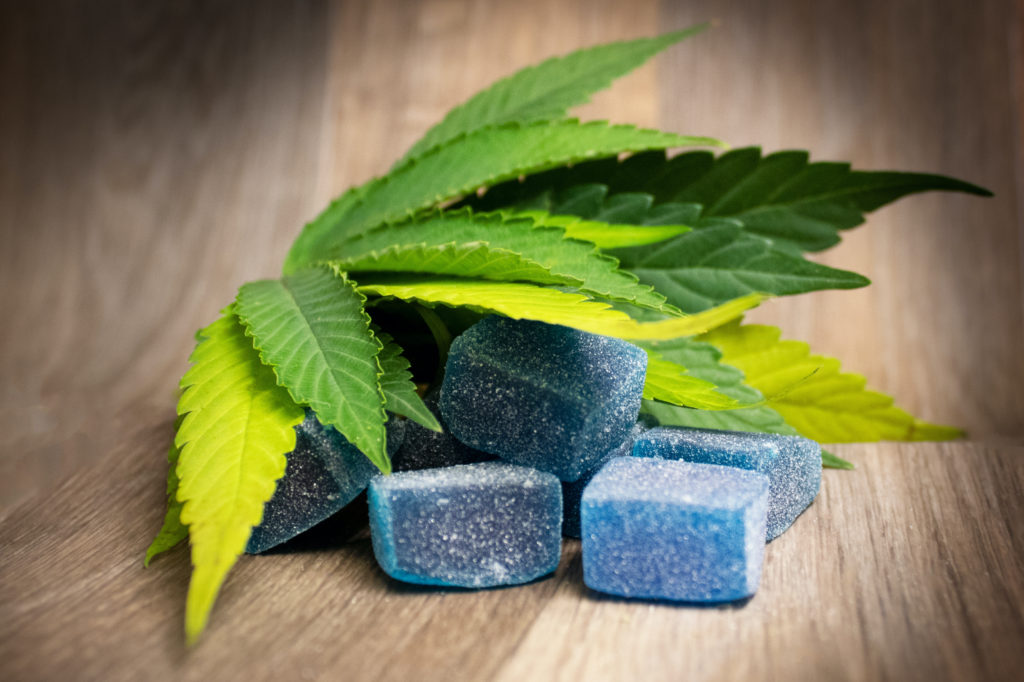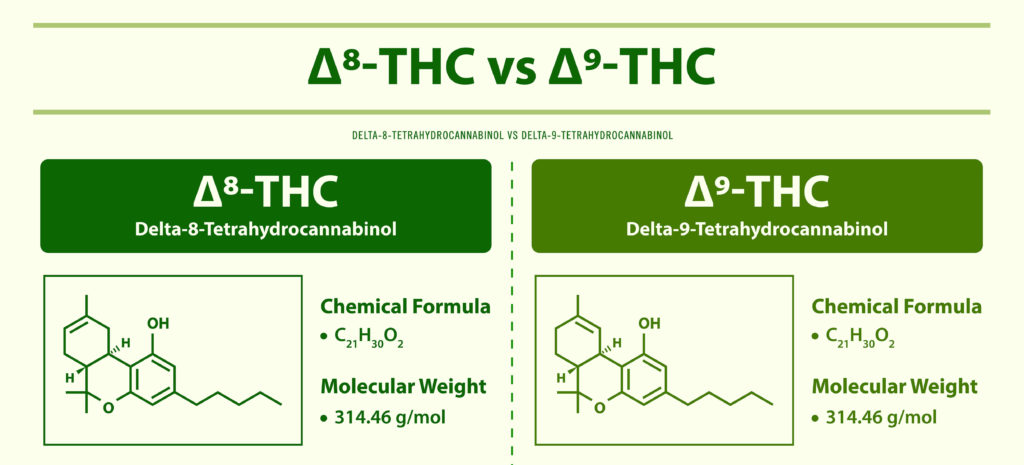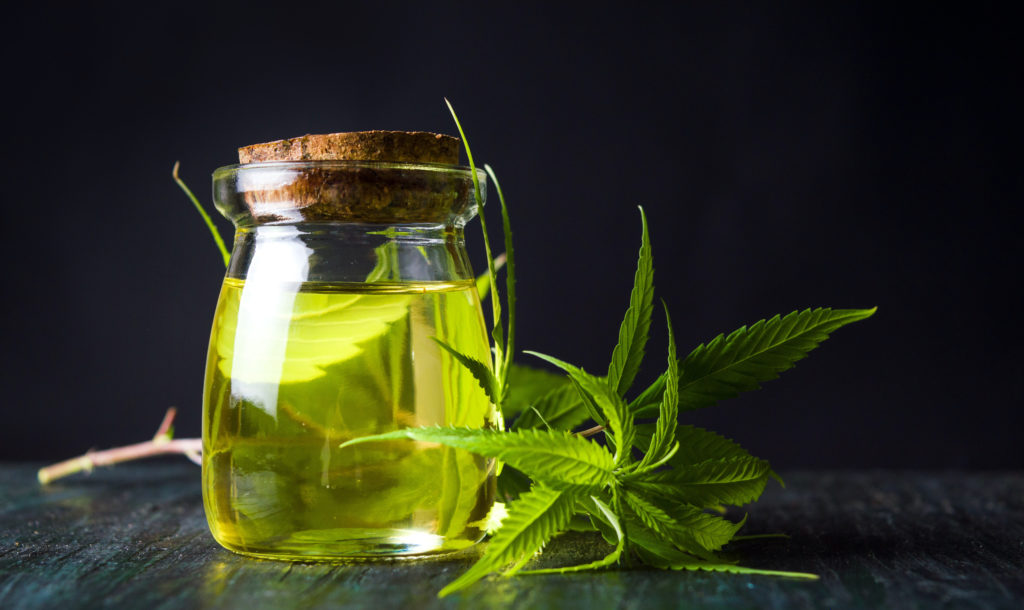
Delta-8 THC (Δ8-THC) is a psychoactive cannabinoid that exists in somewhat of a legal gray area. Although it’s chemically similar to your traditional THC — Delta-9 THC — it’s technically its own unique compound.
Additionally, manufacturers can extract delta-8 THC from hemp, allowing it to evade the legal consequences associated with THC derived from cannabis plants.
The Science Behind Delta-8 THC
Functionally, delta-8 THC possesses many of the same properties and effects as delta-9 THC. According to the National Cancer Institute, delta-8 may offer the following beneficial effects:
- Nausea-relief and anti-vomiting properties
- Anxiolytic (anti-anxiety) or stress-relieving effects
- Appetite stimulation
- Pain relief
- Neuroprotection
Delta-8 THC even has many of the same potential side effects as traditional THC, including:
- An altered sense of time
- Difficulties with short-term memory or concentration
- Dry mouth
- Bloodshot eyes
- Dizziness and/or blurred vision
- A slight increase in heart rate
While delta-8 THC does bind to endocannabinoid receptors, it has less intense psychoactive effects than delta-9 THC.
Delta-8 v.s. Delta-9 THC

Aside from producing very similar effects, the two psychoactive compounds are nearly identical to each other. On a molecular level, both cannabinoids are made of 21 carbon, 30 hydrogen (water), and two oxygen.
The only major structural, chemical difference between delta-8 and delta-9 THC are the placements of their double bonds. Their names, delta-8 and delta-9, are based on which carbon molecule begins the double bond in their chemical structure.
CBD to Delta-8
Although delta-8 THC is a naturally occurring compound in hemp and cannabis plants, manufacturers can also convert CBD into delta-8 THC. In fact, many manufacturers do this conversion because delta-8 THC is traditionally found in very low concentrations in the plant itself.
In its simplest form, the chemical conversion process begins with dissolving CBD in an organic solvent. Then, acid and heat are added. Finally, the resulting delta-8 THC compound is washed, dried, and tested.
While this may sound like groundbreaking technology, this ability to convert CBD into delta-8 THC is by no means a new invention. This process was actually patented by organic chemist Raphael Mechoulam and his colleagues in 1966!
The Safety & Legality of Delta-8 THC
Although delta-8 THC is considered a Schedule I substance, manufacturers can evade the federal restrictions regarding traditional THC by extracting or creating hemp-derived delta-8. This allows the manufacturer to claim it’s a “hemp product” instead of a “cannabis product.”
However, the delta-8 THC market is highly unregulated, leaving many experts and consumers alike to question the safety of delta-8 THC products. This lack of regulations leaves consumers vulnerable to purchasing potentially contaminated or harmful products.
Some state legislators have grown concerned over delta-8 THC, going so far as to ban it altogether. According to NBC News, delta-8 THC is banned in the following states:
- Alaska
- Arizona
- Arkansas
- Colorado
- Delaware
- Idaho
- Iowa
- Kentucky
- Mississippi
- Montana
- New York
- Rhode Island
- Vermont
- Utah
Thus, you have to exercise an air of caution when exploring the delta-8 THC market. Do not purchase delta-8 products from unknown or untrustworthy sources. Be an educated consumer — ask the manufacturer questions about their products. Ask them what the source of their delta-8 THC is and obtain a copy of the certificate of analysis (COA).
Why Has Delta-8 THC Become Popular?
Delta-8 THC has become particularly popular in states where cannabis is still largely prohibited. States that are medical-use only or have no cannabis programs at all are seeing a particular surge in the cannabinoid’s popularity.
Even in states where cannabis use is fully legal, some consumers prefer delta-8 THC because its psychoactive effects are less intense than delta-9.
A study in the American Journal of Public Health used Google Trends reports to assess the growing interest in delta-8 THC between May 17, 2020, through May 9, 2021.
“Interest in delta-8 THC increased in mid-June 2020, with search volumes for delta-8 THC queries currently at 35 percent of the ‘marijuana’ query,” the authors explain. “States where recreational cannabis is illegal had higher relative queries than did states with legalized recreational cannabis.”
Key Takeaway: Delta-8 THC Cautions & Benefits

Delta-8 is very similar to your traditional, delta-9 THC. On a chemical level, delta-8 and delta-9 are nearly identical to one another. As a result, both compounds offer many of the same effects. However, delta-8 has less intense psychoactive effects.
Like delta-9, delta-8 is a naturally occurring compound in cannabis plants. Yet, delta-8 is found in much lower quantities than the former. To supplement the plant’s natural lack of delta-8, manufacturers can chemically convert hemp-derived CBD into delta-8 THC.
Although THC is a Schedule I substance, delta-8 can evade many of the regulations and formalities associated with delta-9 when manufacturers extract it from hemp. Nevertheless, many states have already taken measures to ban delta-8 sales because it’s such an unregulated market.
As with any hemp or cannabis product, being an educated consumer is the top priority. Avoid purchasing delta-8 THC products from manufacturers you’re unfamiliar with, and always ask manufacturers questions to better ensure your safety.